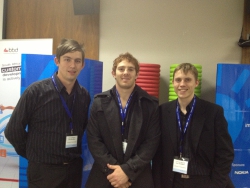| South African mathematics and science educators are often criticised for poor performance in their subject matter and as a result high school learners struggle to pass the subjects satisfactorily. |
|
The University of Johannesburg (UJ)’s Science Centre at the Soweto Campus is addressing this challenge by playing a crucial part in mathematics and science education. The Centre, which will reopen for its 2014 academic year on Saturday, 18 January 2014, was established in 2010 to open the door of knowledge for school children, teachers and the community of Soweto. Says Prof Azwinndini Muronga, Director of the Science Centre, UJ: “There is no doubt that the country needs serious intervention strategies that could strengthen mentorship, support and guidance in curriculum implementation at secondary school level, especially at grade 10, 11 and 12 level. The Centre, aims to address some of the challenges faced by our country in the areas of Mathematics, Science, Engineering and Technology.” Prof Muronga highlights that the Centre is also a necessity in the community because it not only encourages learners to do well in matric, but it also prepares them for the challenges of university. “University lecturers and tutors noticed that some learners are not well prepared academically when they enter university. Many of the schools in Soweto do not have laboratories where learners can do practical experiments,” says Prof Muronga. Through innovative science theory and laboratory lessons, computer training, exhibitions stressing on aspects of everyday life and other developments relevant to South Africa, the UJ Soweto Science Centre is ideally poised to play an important role in nation-building efforts. The principle activities of the Science Centre include: · Teaching theory lessons in mathematics, physical sciences and life sciences · Conducting supervised laboratory and tutorial sessions; · Teaching English for scientific communications, conducting computer training and offering bridging courses for matriculates; · Participating in organising National Science Week, public talks, expo day, science day, career guidance day and other science related activities including mobile science labs, exhibitions, and activities in the space laboratory for Hands-On-Universe and Universe Quest projects. In 2013, the Centre had a total number of 821 learners from schools around Soweto and surrounding regions. Of these leaners 82% showed an improved mark in the relevant subject. Leaners attended supervised laboratory and tutorial sessions on Friday afternoons and theory lessons on Saturday and during school recess. This year’s programme is designed on a university model to introduce the learners to a university culture, thereby bridging the cultural gap between high school and university. The learners are also provided with the necessary learning material for each grade level. The Centre has also a teachers’ development programme. “Our focus is not just on learners but also on teachers,” says Prof Muronga. “In collaboration with SciBono, the Centre also assists in empowering and enhancing the skills of mathematics and science teachers. The Centre provides teachers with the educational support and assistance with mathematics and science learning content, mathematical and science related skills, professional development, and knowledge and skills related to curriculum development and implementation. The Centre serves as an alternative and additional resource centre for mathematics and science teachers as well as mathematics and science study rooms. Computer laboratories with internet access, are used to train teachers in the use of relevant technology at different levels for various purposes.” The enhancement of teacher professional development at the Centre is further augmented through a Teacher Development Project coordinated as part of the partnership involving the South African Institute of Physics (SAIP), Institute of Physics (UK) and the University of Johannesburg. Article issued by University of Johannesburg |
